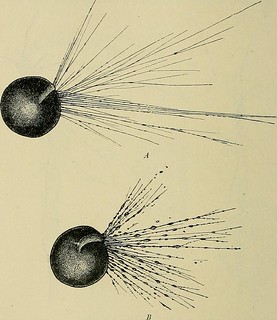- External URL
- Creation
-
Creator (Definite): Ira Thompson Van GiesonDate: 1898
- Current Holder(s)
-
- No links match your filters. Clear Filters
-
Quoted by
 Henri Bergson's Physiological Psychology: Vitalism and Organicism at the Start of the Twentieth Century
Henri Bergson's Physiological Psychology: Vitalism and Organicism at the Start of the Twentieth Century
Description:'Adherents of cellularly-distinct conceptions of neuronal connection portrayed them as confirming associationist contentions regarding the nature of psychology... In 1898, Boris Sidis and Ira van Gieson separately elaborated this thesis to account for states of sanity and insanity: in Gieson's words, 'unsoundness of mind' was caused by the 'dissociation' of the 'higher and last evolved parts of the brain, in the presence of pathogenic stimuli.'
-
Quoted by
 T. Quick, 'Disciplining Physiological Psychology: Cinematographs as Epistemic Devices, 1897-1922', Science in Context 30 (4), pp. 423-474.
T. Quick, 'Disciplining Physiological Psychology: Cinematographs as Epistemic Devices, 1897-1922', Science in Context 30 (4), pp. 423-474.
Description:'Adherents of cellularly-distinct conceptions of neuronal connection portrayed such studies as confirmatory of associationist contentions regarding the nature of psychology (Black 1981, 44-45). For example, US physician Francis Xavier Dercum argued that the 'amoeboid' expansion and retraction of individual cells underlay variously: hysteria; hypnotic and dream states; sleep; and trains of thought themselves. These latter, Dercum contended, appeared 'to follow purely mechanical lines' of association and disassociation between the sense impressions that they carried (Dercum 1896, esp. 520-523. Quote on 522. Original emphasis). In 1898, Boris Sidis and Ira van Gieson elaborated this thesis to account for states of sanity and insanity: in Gieson's words, 'unsoundness of mind' was caused by the 'dissociation' of the 'higher and last evolved parts of the brain, in the presence of pathogenic stimuli' (van Gieson 1899, 87; Sidis 1919, 208-215.).'
Relevant passage from Gieson:
'Generally speaking, the organization of the nervous system in relation to function may be described somewhat as follows: The most supremely organized parts of the nervous system, the last attainment in man's evolution, the most precious part of the brain, which it has taken eons of time to evolve, which gives man his discrimination, his powers of ratiocination, his self-control, are the most unstable parts of the make-up of the nervous system. These higher and last evolved parts of the brain are prone, in the presence of pathogenic stimuli, to become dissociated from the remainder of the nervous system first and with their dissociation appear the first beginnings of unsoundness of mind. It may be seen, then, how absolutely essential it is to have the complete story of the evolution of man's brain, both in the individual and in the species, and to find out how this nervous system has been progressively built up, one part added after another, corresponding with higher and higher functions.' (87)







